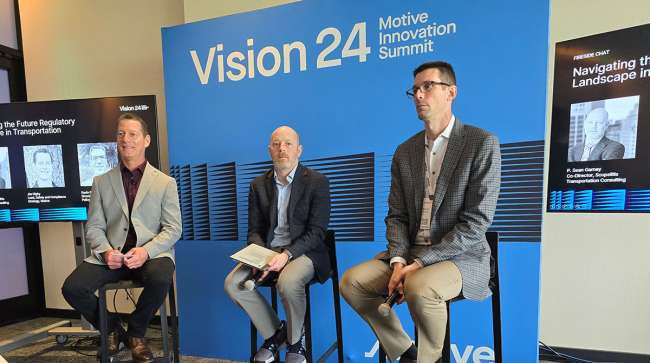Senior Reporter
Regulatory Issues Highlight Motive Panel Discussion

[Stay on top of transportation news: Get TTNews in your inbox.]
NASHVILLE, Tenn. — A panel of trucking executives gave attendees at a Vision 24 Motive Innovation Summit session its views on a sampling of future regulatory issues, ranging from the next anticipated developments on speed limiters to expected tweaks to the way regulators rate motor carriers.
But first, they discussed the most recent challenge for the Federal Motor Carrier Safety Administration’s seeming revolving door at the top — left empty once again when Robin Hutcheson resigned in January.
“The FMCSA seems like an agency in permanent transition,” said panelist Sean Garney, co-director of Scopelitis Transportation Consulting. “Just this morning, I counted seven acting or Senate-confirmed administrators in the past six years. So we’ve gotten pretty used to dealing with the revolving door.”
“Whenever there’s a change in the administrator, the agency is challenged to figure out how the new administrator will view ATA’s policies, what issues they may be prioritizing or what issues they are passionate about,” said panelist Kevin Grove, director of safety and technology policy for American Trucking Associations.
The FMCSA seems like an agency in permanent transition.
Sean Gurney of Scopelitis Transportation Consulting
“There are potentially political issues that are considered when it comes to high-level election changes. Sometimes you see a slowdown in the rulemaking process.”
“I think a good example of this is CSA,” Garney said, referring to the agency Compliance, Safety, Accountability carrier rating system. “We knew proposed changes were coming down the pike for years and years. But under former President Trump there were several acting administrators who said they knew what they were going to do, but they couldn’t really pull the trigger. To do so under an acting administrator, it’s just a little bit riskier.”
The panel moderator, Jim Higby, lead for safety and compliance strategy for Motive Technologies Inc., noted that the accuracy of CSA has been questioned as an effective way to measure the safety performance of motor carriers.
“What do you see happening, and is it a good thing or not?” Higby asked.
“Well, it obviously is a good thing to try and improve it,” Grove said. “We all realize that it’s not been a perfect system for a long time.”
But Grove said ATA supports CSA, despite the fact that it was “a little too complicated for fleets to understand.”
“The fundamental change is going to be a movement away from which violations are more important to a move to how many times you are violating rules,” Garney said.
Volvo's Chayene de Souza and Magnus Gustafson discuss how new, connected trucks can boost business, enhance safety practices, and reinforce preventative maintenance plans. Tune in above or by going to RoadSigns.ttnews.com.
“What about speed limiters?” Higby asked. A supplemental proposed rule is due out next month, according to FMCSA.
“I think we’ll see a speed limiter rule,” Garney said. “But I think it’s going to be a disaster to enforce. You can look at Ontario, how they’ve been enforcing it, and how terrible that’s gone. It’s going to be difficult, and there will be a whole cottage industry of defeat devices to trick the speed governors.”
What’s in store for attempts by California’s AB 5 independent contractor rule, and a new federal contractor regulation on contractor classification?
“Independent contractors are the lifeblood to our industry,” Garney said. “I think it’s going to play out in the courtroom. We’re still waiting to see what kind of enforcement it looks like.”
Grove added, “We think the existing model has a lot of things going for it, and it works for both drivers and fleets. We need to get drivers in the seats. But we want to be sure we are doing it safely.”
Want more news? Listen to today's daily briefing below or go here for more info:





